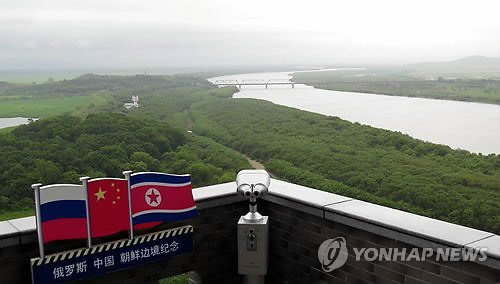- California Assembly OKs highest minimum wage in nation
- S. Korea unveils first graphic cigarette warnings
- US joins with South Korea, Japan in bid to deter North Korea
- LPGA golfer Chun In-gee finally back in action
- S. Korea won’t be top seed in final World Cup qualification round
- US men’s soccer misses 2nd straight Olympics
- US back on track in qualifying with 4-0 win over Guatemala
- High-intensity workout injuries spawn cottage industry
- CDC expands range of Zika mosquitoes into parts of Northeast
- Who knew? ‘The Walking Dead’ is helping families connect
North Koreans pay over $8,000 to escape
By Rachel Lee
North Koreans pay up to 10 million won ($8,440) to brokers or border guards to escape from their country, according to activists helping defectors.
Most North Korean defectors cross the Tumen River to China’s Yanbian. The cost of crossing the river has risen several times since Kim Jong-un took power in 2011.
The fees have gone up to 10 million won this year from some 8 million won a year earlier.
Between 2011 and 2012, the fees were around 2 to 4 million won.
Out of the total, North Korean border guards take about 40 percent and the rest goes to brokers. When defections are arranged directly through the border guards, there is no need for the defectors to pay a broker, sources said.
According to the South Korean think tank, Zeitgeist, the cost to defect was around 40,000 to 50,000 won in 2000 and 2001, and the border guards took all the money. It reached 150,000 won and 400,000 won in 2002 and 2005, respectively.
North Korean watchers say this sharp rise in the cost of defecting is a result of North Korea’s massive crackdown on defecting by monitoring border crossings and tracking down brokers.
“North Korea has tightened its monitoring of border guards,” Ahn Myung-chol, head of NK Watch, said. “It’s possible for a group of two to keep information confidential with each other, but it doesn’t quite work the same when there are three people involved. Also those who report abettors are rewarded, and this has caused the cost of defecting to become more expensive.”
Ahn also said that China has stepped up its crackdown on North Koreans crossing the river after a shooting incident by North Korean border guards earlier this year, in which two Chinese were killed.
Jung Kwang-il, No Chain director, said, “Due to the North’s strict control, border guards either do not dare to get involved in helping defectors or they take the risk and ask for higher fees.”
The number of North Korean defectors in South Korea has decreased since Kim Jong-un took power four years ago.
According to the Ministry of Unification, the number fell below the monthly average of 100 for the first time in 12 years. The number of North Koreans who were officially tagged with defector status in the first 10 months of this year totaled 978, for a monthly average of about 98.
The annual number of defectors reached a peak of 2,914 in 2009. Since then the number has gone down to 1,397 in 2014 and 614 in the first half of this year.













![일본 사도광산 [서경덕 교수 제공. 재판매 및 DB 금지]](http://www.koreatimesus.com/wp-content/uploads/2024/07/PYH2024072610800050400_P4-copy-120x134.jpg)


